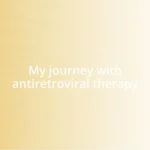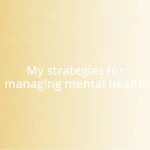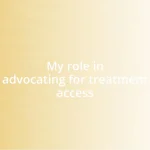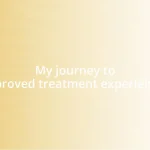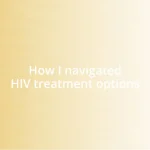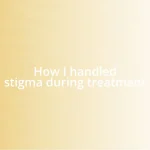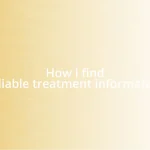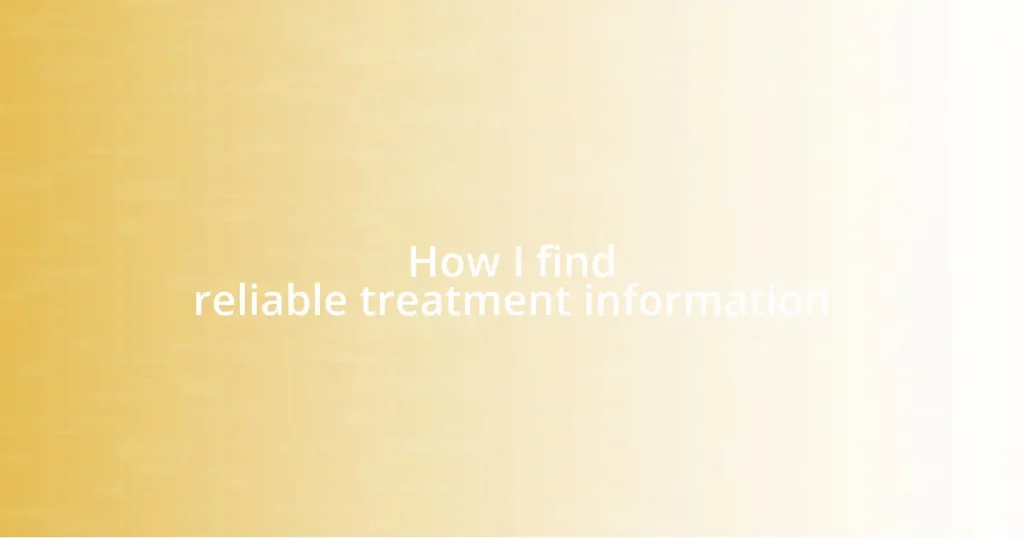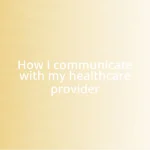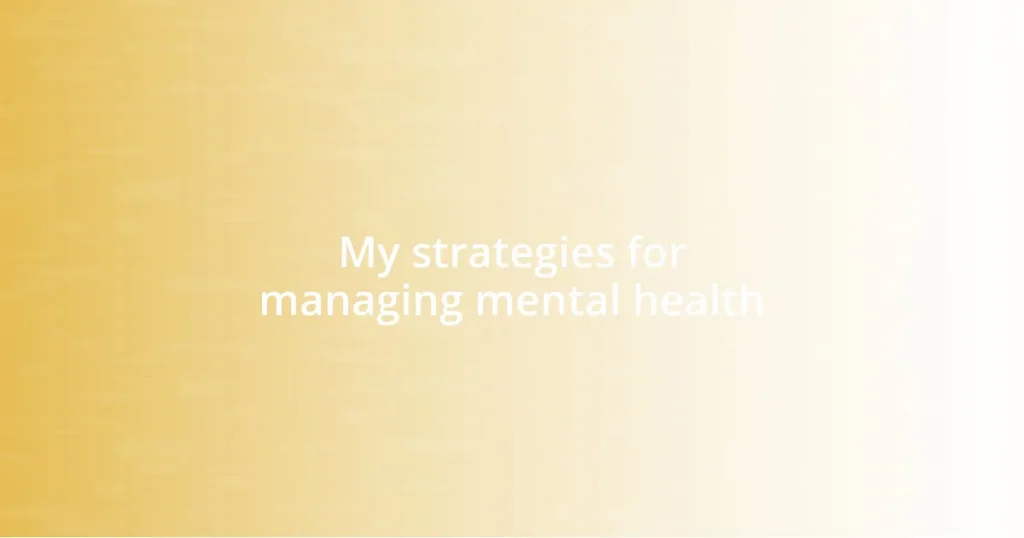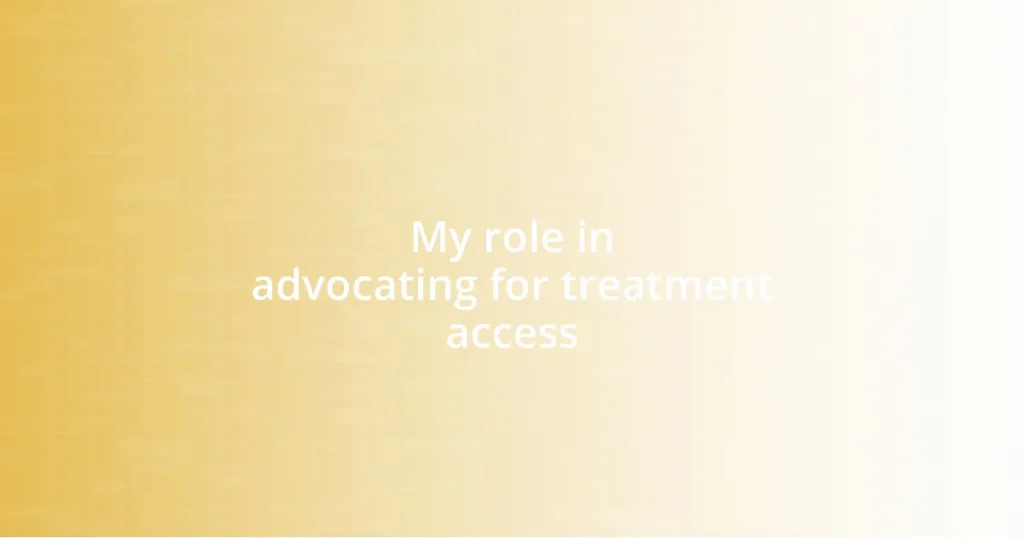Key takeaways:
- Verify the source of treatment information, prioritizing recognized medical institutions over personal blogs or social media influencers.
- Check the credentials of experts, looking for formal qualifications and relevant experience in the specific medical field.
- Utilize peer-reviewed studies and trustworthy health websites to ensure the information is evidence-based and up-to-date.
- Cross-reference multiple credible sources to build confidence in decisions related to healthcare treatments.
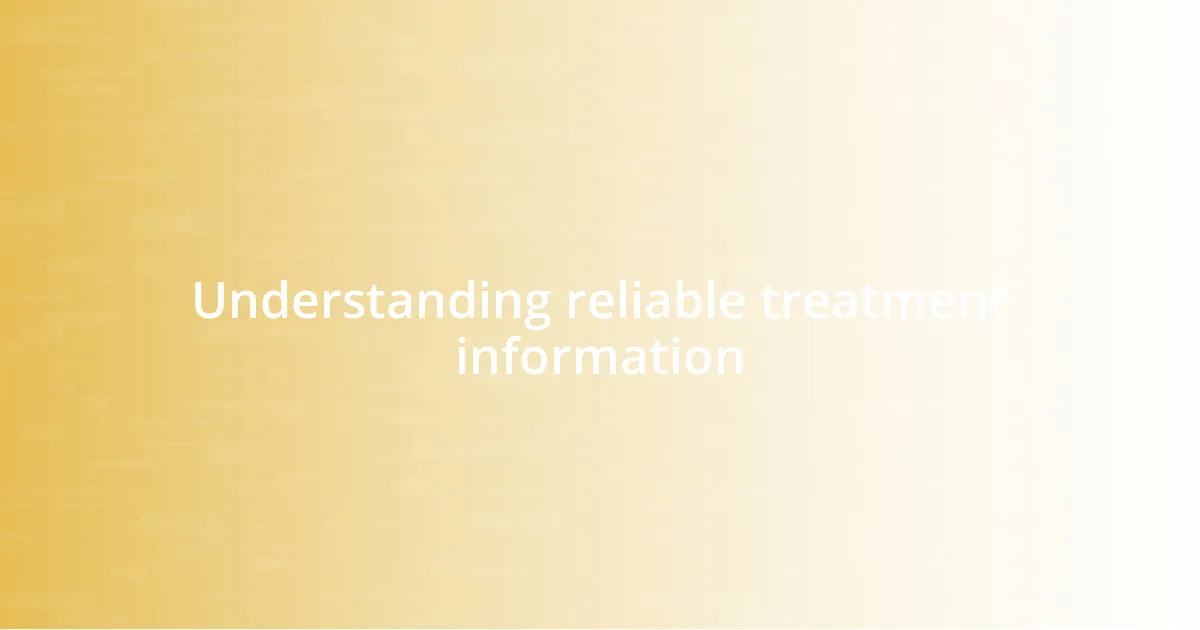
Understanding reliable treatment information
Understanding reliable treatment information is crucial in navigating the often overwhelming world of healthcare. I still remember the time I sifted through countless websites, desperately looking for answers about a health condition I was dealing with. It was frustrating to see so much conflicting information, making me question what to trust.
When evaluating treatment information, I focus on the source. Is it from a recognized medical institution or a personal blog filled with unverified claims? I once followed a trending treatment idea from a social media influencer, only to realize later that their suggestions lacked scientific backing. It’s a reminder that credibility matters above all else.
Moreover, I always check if the information is current. Medical knowledge evolves rapidly, and what was once considered valid might not hold up today. Have you ever wondered how often your go-to health website updates its content? I now make it a habit to look for the latest research and guidelines, ensuring I’m informed by the best available evidence.
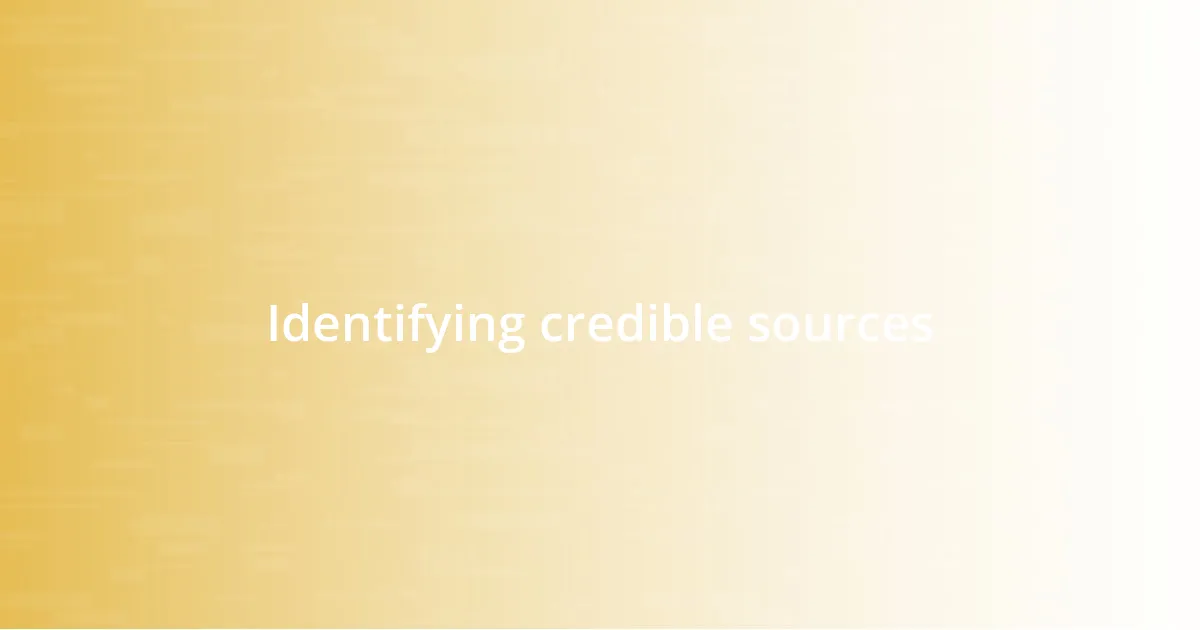
Identifying credible sources
When I seek out reliable treatment information, the credibility of the source stands out as a non-negotiable factor. I’ve often had moments where I stumbled upon a source that seemed promising at first, only to discover it was riddled with inaccuracies. That experience highlighted the importance of verifying where the information originates. I now make it a point to look for established medical organizations or peer-reviewed journals, as they typically provide more trustworthy content.
To help you identify credible sources, consider these tips:
- Check the author’s credentials: Look for qualifications or expertise in the relevant field.
- Look for references: Reliable articles usually cite reputable studies or clinical guidelines.
- Assess the publication date: Ensure the information is up-to-date, especially in a fast-changing field like medicine.
- Evaluate design and bias: Professional websites generally have a polished look and avoid sensational language.
- Cross-reference information: Compare findings with multiple trustworthy sources to see if they align.
Practicing these steps has transformed how I consume health information, making me more confident in my choices.
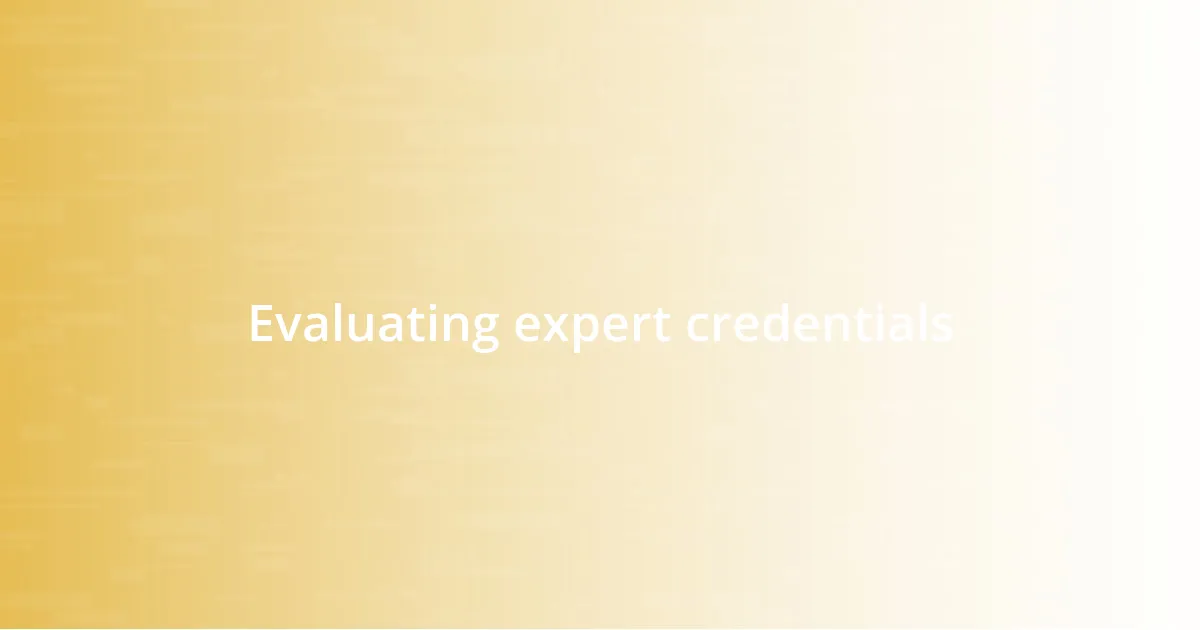
Evaluating expert credentials
When it comes to evaluating expert credentials, I find it’s crucial to dig deeper than just surface-level claims. For instance, I once read an article penned by someone who cited themselves as a “health expert.” Skeptical, I looked them up and discovered they had no formal medical training—just a personal blog. That experience truly reinforced my belief in the importance of verifying qualifications. A solid credential, such as an MD or PhD, can provide assurance that the information is grounded in reliable knowledge.
It’s also important to consider the individual’s experience in the specific area you’re investigating. I remember a time when I sought advice regarding a niche medical condition. I discovered a doctor specializing exclusively in that field, with years of experience and numerous publications to their name. This gave me confidence that I was receiving informed, targeted guidance rather than general advice.
Lastly, don’t overlook the affiliations of an expert. Are they associated with reputable institutions or organizations? This can add another layer of credibility. When I found a healthcare professional working with a well-known medical university, I felt much more at ease with their insights. It’s remarkable how the right credentials can turn your anxious search for treatment information into a more confident and empowering journey.
| Aspect | Considerations |
|---|---|
| Qualifications | Look for relevant degrees (e.g., MD, PhD) and certifications. |
| Experience | Check if they have specialized expertise in the area related to your concerns. |
| Affiliations | Assess their connections with reputable medical institutions or organizations. |
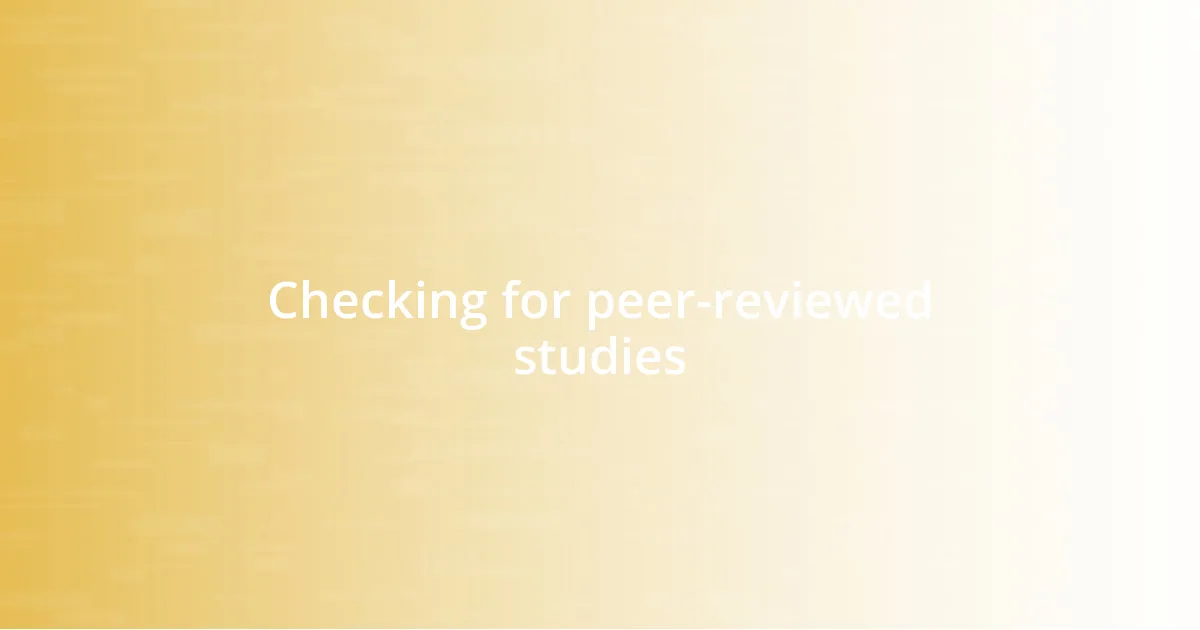
Checking for peer-reviewed studies
When it comes to understanding treatment options, I often turn to peer-reviewed studies as my go-to source. These studies don’t just appear out of thin air; they undergo a rigorous evaluation process by experts in the field. The first time I came across a peer-reviewed article that directly addressed my health concern, I felt a wave of relief wash over me. It was comforting to know that I was reading something backed by the scientific community rather than an unverified opinion or hearsay.
Diving deeper into peer-reviewed literature can reveal a wealth of information. I remember sifting through articles to prepare for a discussion with my healthcare provider. One study I found not only supported a particular treatment but also outlined specific outcomes and side effects. This added depth to my understanding and allowed me to articulate my thoughts more clearly during our appointment. Have you ever found yourself wishing you had more concrete information to discuss with a doctor? Finding solid studies can empower you to engage in meaningful conversations about your health.
However, it’s essential to keep in mind that not every published study is flawless. I’ve encountered some with limitations, and I had to learn to evaluate their methodologies. For instance, I once read a study with a small sample size, leading me to question the applicability of its findings. Thinking critically about a study’s design and context has taught me to balance optimism about potential treatments with a cautious mindset. This journey has not just made me a more informed patient, but it’s also cultivated a deeper appreciation for the complexities of medical research.
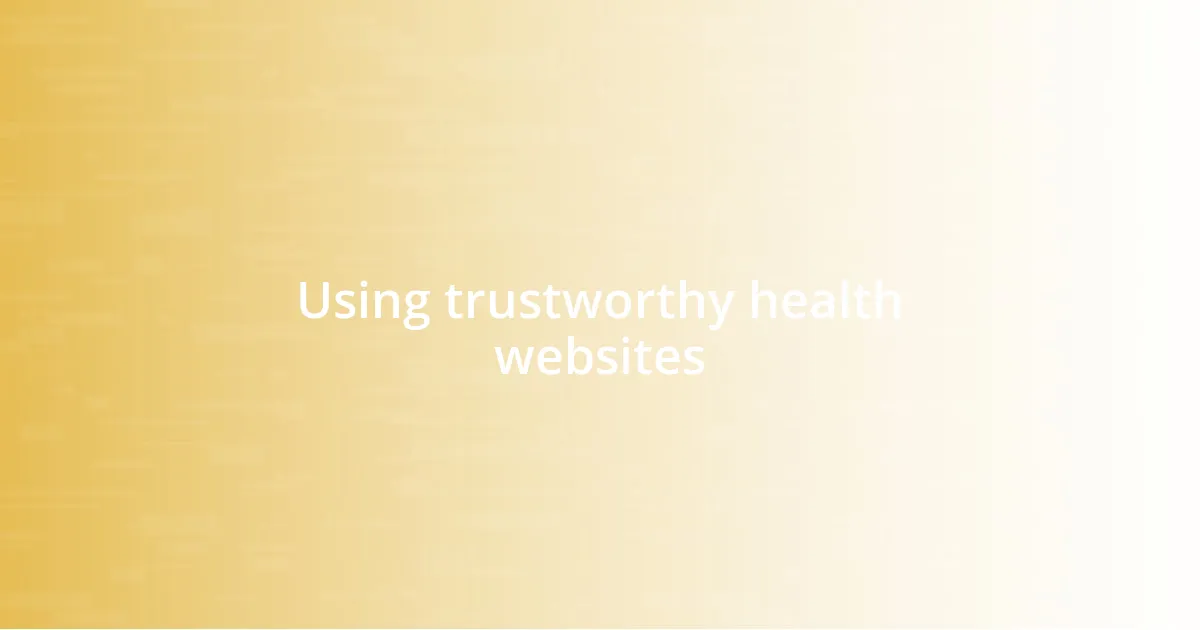
Using trustworthy health websites
Using trustworthy health websites can significantly enhance your search for reliable treatment information. I remember a time when I was overwhelmed by the endless sea of online health content. Diving into a website that was part of a respected medical institution gave me clarity. The information was evidence-based and updated regularly, which calmed my anxiety and made me feel secure in my choices.
It’s easy to get lost among countless sources, but focusing on sites affiliated with universities or government entities can be a game changer. One day, while exploring treatment options for a friend’s chronic condition, I stumbled upon a government health site filled with valuable resources, including guidelines and professional recommendations. It felt like I was unlocking a treasure trove of well-researched insights that you couldn’t get from random blog posts. Can you imagine finding such trustworthy information at your fingertips, helping not just yourself but others you care about?
Additionally, I always look for websites that provide clear citations and references for their claims. I once found an online article lauding a particular therapy, but without solid references, I hesitated to share it. It reminded me how crucial it is to ensure that any health website not only presents information but also backs it up with credible sources. The more I sought reliable treatments, the more I realized the power of being not just a passive reader, but an active seeker of verified health information.

Cross-referencing multiple sources
Cross-referencing multiple sources has become my safety net when I’m navigating the often murky waters of treatment information. I remember one instance where I was researching a new medication and stumbled upon mixed reviews from various platforms. One site praised its effectiveness while another highlighted significant side effects. This contrast pushed me to dig deeper, leading me to reliable sources that ultimately portrayed a more balanced picture. Isn’t it fascinating how different perspectives can lead you to uncover the full story?
When I hear conflicting information, I’ve learned to take a step back and collect data from three or more credible sources. For instance, during a health scare related to a family member, I found several articles discussing the same treatment. Some leaned heavily on anecdotal evidence, while others were research-based. I felt like a detective piecing together clues, seeking to understand both the benefits and drawbacks. Have you ever felt that rush of connection while gathering information that felt like it was guiding you on the right path?
In my experience, the act of cross-referencing isn’t just about finding facts; it’s about building confidence in my decisions. One time, I encountered a blog filled with personal stories that seemed compelling, but I was hesitant to base anything on those tales alone. By comparing them with clinical studies and expert opinions, I managed to filter out the noise and focus on what truly matters: safety and efficacy. This journey of validation not only informed my choices but also enriched my understanding of healthcare. Isn’t it empowering to know you’ve sifted through the information to stand on solid ground?
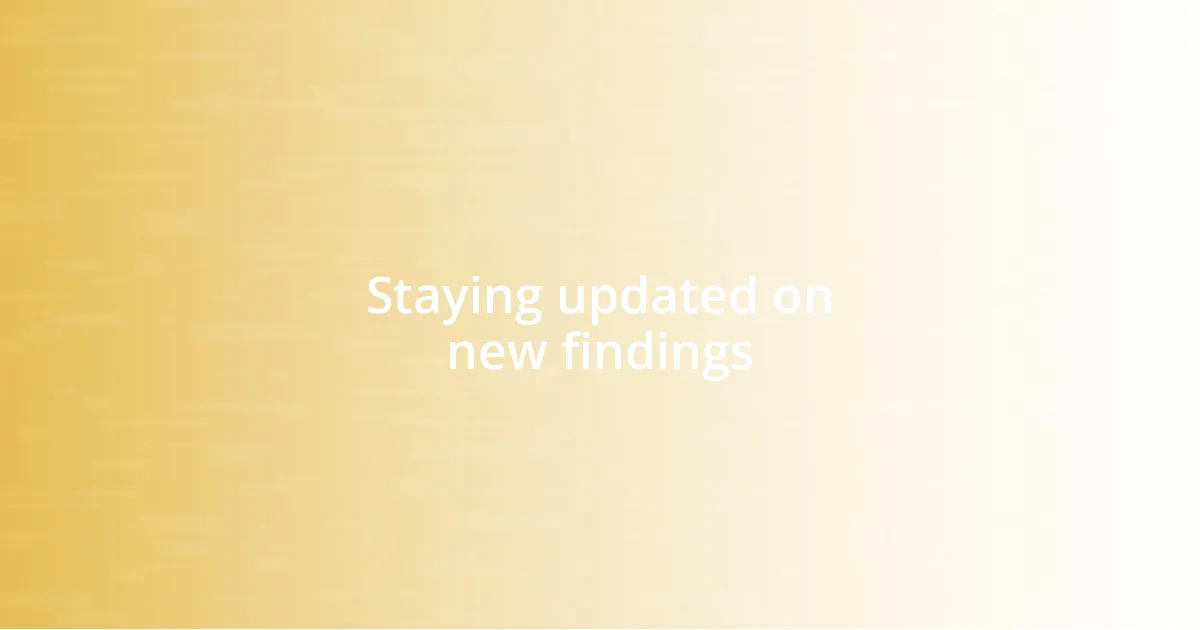
Staying updated on new findings
Staying updated on new findings is crucial in the ever-evolving landscape of healthcare. I always subscribe to newsletters from reputable medical journals. A while ago, I received a special edition discussing groundbreaking research on a treatment I was considering. It felt like being handed a golden ticket to the forefront of medical innovation. Can you imagine reading the latest findings while genuinely knowing that you’re engaging with top-tier insights?
In addition to newsletters, I often attend webinars and online conferences. Once, I participated in a session where leading experts discussed newly approved therapies. The excitement in the virtual room was palpable, as we shared thoughts in real-time. It sparked fresh ideas and even challenged my beliefs about certain treatments. Have you ever had a moment where you were so inspired by new information that it changed your perspective completely?
I also make it a habit to follow healthcare professionals on social media. One day, I came across a post by a doctor who shared impressive results from a clinical trial. Their passion was contagious, and it motivated me to delve deeper into the findings. Engaging with experts through social media has transformed my understanding and has kept me on the cutting edge of treatment advancements. Isn’t it remarkable how technology connects us to innovative ideas and fresh knowledge in such an accessible way?
